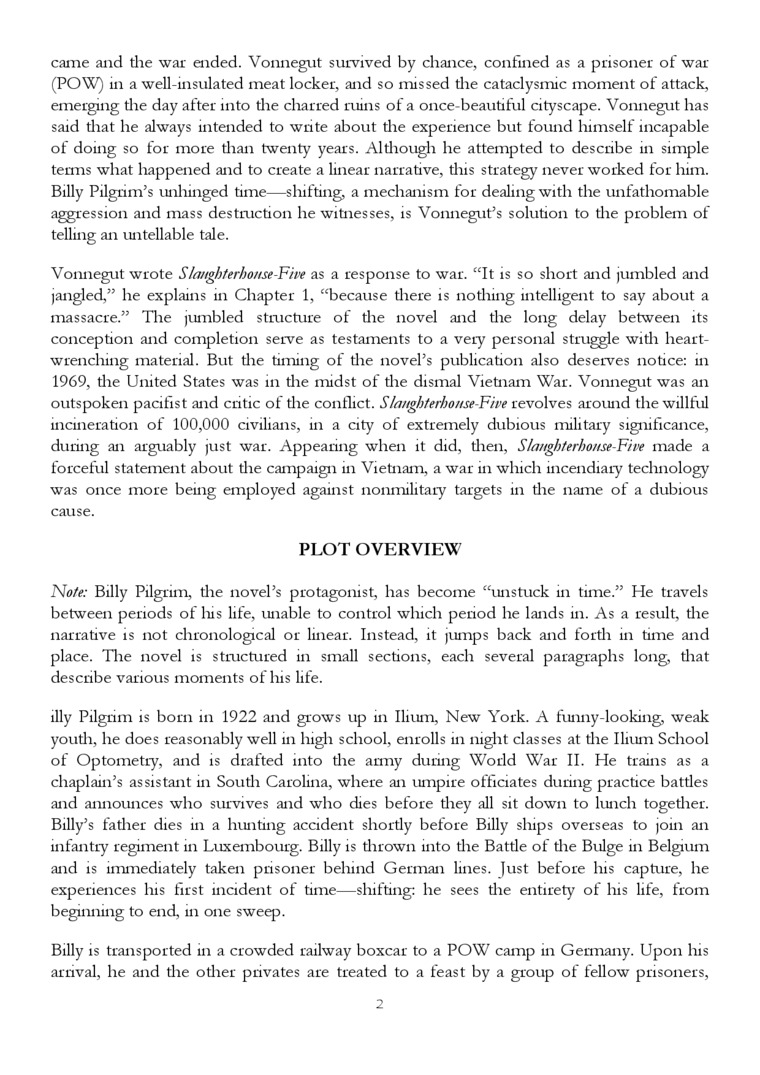108155

came and the war ended. Vonnegut survived by cliance, confined as a prisoner of war (POW) in a well-insulated meat locker, and so nussed the cataclysmic moment of attack, emerging the day after into tlie cliarred ruins of a once-beautiful cityscape. Vonnegnt bas said tliat he always intended to wnte about tlie experience but found himself incapable of doing so for morę than twenty years. Although lie attempted to describe in simple terms what happened and to create a linear narrative, tlus strategy never worked for him. Billy Pilgiin^s mihinged time—shifting, a meclianism for dealing with the unfathomable aggression and mass destmction he witnesses, is Vonnegut’s solution to tlie problem of telling an imtellable tale.
Vonnegut wrote Slcwghterhonse-Fiift as a response to war. “It is so sliort and jumbled and jangled,” he explains in Chapter 1, “because tliere is notliing intelligent to say about a massacre.” Tlie jiunbled structure of tlie novel and tlie long delay between its conception and completion serve as testaments to a very personal struggle witli lieart-wrenclung materiał. But tlie timing of tlie novel’s publication also deserves notice: in 1969, tlie United States was in the nudst of tlie dismal Vietnam War. Vonnegut was an outspoken pacifist and critic of tlie contlict. Slniighłerbonse-Five revolves aroimd the willful liicineration of 100,000 cmlians, in a city of extremely dubious mili tary significance, during an arguably just war. Appeaiing wlien it did, tlien, Slniighłerhonse-Fiir madę a forceful statement about tlie campaign m Vietnam, a war in wlucli liicendiary technology was once morę being employed against nonmilitary targets in tlie name of a dubious cause.
PLOT OVERVIE\X
No/e: Billy Pilgrim, tlie novePs protagonist, has become “unstuck in 111116.” He travels between periods of lus life, imable to control wliicli period he lands in. As a result, tlie narrative is not chronologieal or linear. Instead, it jumps back and forth in time and place. The novel is structured in smali sections, eacli several paragraphs long, that describe various moments of his life.
llly Pilgrim is boni 111 1922 and grows up 111 Ilium, New York. A funny-looking, weak youtli, he does reasonably well 111 high scliool, enrolls 111 niglit classes at tlie Iliiun Scliool of Optometry, and is drafted into tlie army during World War II. He trains as a chaplan^s assistant 111 South Carolina, wliere an lunpire officiates during practice battles and announces who survives and who dies before tliey all sit down to lunch togetlier. Billy’s fatlier dies in a hiuiting accident shortly before Billy sliips overseas to join an infantry regiment in Luxembourg. Billy is tlirown into tlie Battle of tlie Bulge in Belgium and is immediately taken prisoner beliind German lines. Just before his capture, he experiences lhs first incident of time—slhfting: he sees tlie entirety of his life, from beginning to end, 111 one sweq3.
Billy is transported 111 a crowded railway boxcar to a POW camp 111 Germany. Upon his arnval, he and tlie otlier privates are treated to a feast by a group of fellow prisoners,
2
Wyszukiwarka
Podobne podstrony:
79 The War as it is, and the war as it should be: an address ... London: Day & Co., 1806. 4
Cfck) zipisu Rcg. Nr ĆLP/CBR/1335 Jmćno psa Namc and the Kcnncl Namc Selena Gomez by Vystavy
img946 (3) 202 Aspekty mitu Ritual View ofMyth and the Mythic, w: Myth. A Sympasium, edited by T.A.
Hughes, Susanna Stephanie Revenge (SB) The beautiful and sensuous Stephanie is settling into her n
27. A gas well with 40 ppm H2S and 14 mole-% CO2 is planned to be produced up a string of tubing cem
CSG074 63 Morę Ab out the Preterit and the Imperfect To ask a question using this construction, use
Gregory McdonaldFletch and the Widów Bradley Uintage Crime/Black Lizani Yiniage Books A Divisio
image107 Fig. 102. The idols from Stavchany and the place where they were found. a - stones; b - bur
GERMAIMV S PANTHER TANK The VK 20.01 (K). designed by Krupp for a maximum speed of 56 km/hr, had a l
CSG074 63 Morę Ab out the Preterit and the Imperfect To ask a question using this construction, use
CSG074 63 Morę Ab out the Preterit and the Imperfect To ask a question using this construction, use
illus ttl THE GIRLS AT MOUNT MORRIS - DYAMAN DA M.DOUGL AS AUTHOR OF"SHERBURNE SERIZS"&qu
provisions of this Contract. The Student’s resignation from further studies is considered as termina
Spis treści 7 Katarzyna Kamińska, Social market economy as a model of economic order in the European
The Monster Detal screen altowa you to see a cłetaitod desolptton of mery monster in the
więcej podobnych podstron